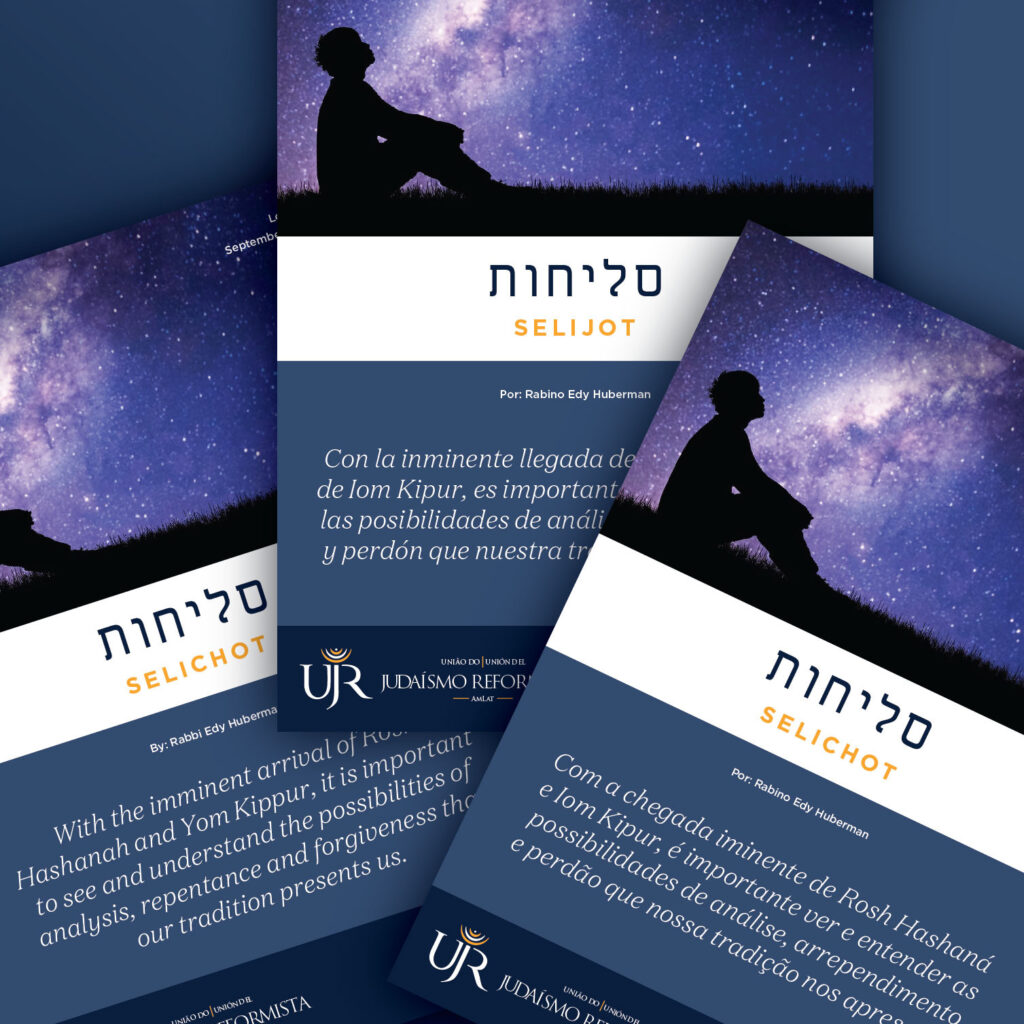סליחות
Selichot
By: Rabbi Edy Huberman
With the imminent arrival of Rosh Hashanah and Yom Kippur, it is important to see and understand the possibilities of analysis, repentance and forgiveness that our tradition presents us.
Since the beginning of the month of Elul, we go through a time of soul-searching and reflection that allows us to prepare ourselves for the magnitude of the Yamim Noraim. It is during this time that we perform the tefillot of Selichot. In Hebrew, Selichot translates as “forgiveness” and, in addition to the explicit request for forgiveness for our transgressions and mistakes, in these prayers God’s merciful attributes are repeated and exalted. Selichot are a form of introspection and repentance, intended to reflect on past actions and seek reconciliation with God before Yom Kippur, when we understand that people’s destinies for the coming year are sealed. They are usually composed of selected poems and psalms.
The period during which Selichot are performed occurs, for the Sepharadim, from the beginning of Elul. They are usually recited during the early morning hours, creating an atmosphere of devotion and spirituality. For Ashkenazim, Selichot occur on the Saturday before Rosh Hashanah (provided that there are at least four days of difference. Otherwise, they are held at the end of the previous Shabbat).
The liturgy of Selichot includes poetic verses and fragments from the Tanach, and different communities have different traditions and customs as to how and when they are recited. The main themes of the tefillot are: repentance, forgiveness, humility and the search for redemption. At the same time, they seek to establish a deeper connection with our spiritual experience. The Selichot are a reminder of the importance of self-reflection and play a fundamental role in the spiritual preparation for the Yamim Noraim.
The question is: do we need a special ritual to analyze our behavior and go through the process of “cheshbon hanefesh” and “teshuvah”? And, since the process is personal and it is up to us to do it individually, why do we do it communally?
Honestly, I believe that the answer takes us back to a central value of Jewish life. The function of rituals is to integrate and the central idea of Judaism is essentially integrative. The vital and annual cycle of our tradition cannot and should not be lived in solitude. Teshuvah is, yes, “personal and non-transferable” but adherence to a collective and communal ritual and participation in it contributes to social cohesion. This transfer from the individual to the collective, from the personal to the community, not only reinforces the request for forgiveness but, more importantly, the importance of mutual responsibility.
The meeting, in person or virtually, and the collective expression are the clear expression of the concept “Col Israel arevim ze la ze” (all the Jewish people are guarantors for each other, Talmud Babli, Shevuot 39a). We are and are included in the collective request because we recognize a shared responsibility.
We see this same bridge between the private and the collective reflected in assuming our responsibility for the words and actions we perform and, with the same relevance, for the silences, omissions and inactions when we see other people’s faults. We are not responsible for the actions that others carry out, but we are responsible for raising our voice in the face of an injustice, so as not to be accomplices.
In the Talmud (in this case in Shevuot 39b) we read: “There, in that verse (“And they shall stumble over one another” – Vayikra 26:37), reference is made to a case in which others had the ability to protest the transgression and yet did not protest”. Rambam clarifies it this way: “Anyone who could have admonished (his fellow) and did not do so, ends up being punished for his sin, inasmuch as he could have rebuked him and did not do so” (Rambam, Mishneh Torah, Hilchot Deot 6).
In synthesis, from the beginning of Elul until Yom Kippur we go through a period of analysis, repentance and request for forgiveness. We begin and end these days with the same words: asking God, from the deep humility that reflects a sincere repentance, to accept our prayers and give us His forgiveness. May he judge us individually, but in a collective request that reflects our unity as a community and as a people.
I hope that we can combine the personal and the collective, that we can forgive and be forgiven in order to receive a year of blessings.
Rabbi Edy Huberman





